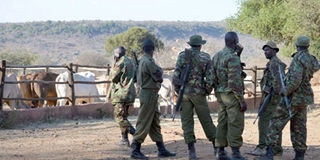Ensure justice for all Laikipia residents

Police officers patrolling Sosian Ranch in Laikipia County. FILE PHOTO | STEVE NJUGUNA | NATION MEDIA GROUP
What you need to know:
- The government, which seemed to be in denial about the seriousness of the security situation in Laikipia, has finally sent in security forces, but they seem powerless to restore order.
- Reeling under the impact of one of the worst droughts in living memory, locals are starving for the sake of wildlife.
As I write this, Kuki Gallmann, the renowned Kenyan conservationist, lies in hospital after being shot by bandits at her home in Laikipia County.
This follows the murder earlier this year of another landowner in Laikipia, Tristan Voorspuy.
This is all part of an unprecedented wave of violence, as armed herders invade properties, kill wildlife, burn down houses and terrorise landowners.
The government, which for a long time seemed to be in denial about the seriousness of the situation, has finally sent in security forces, but they seem powerless to restore order.
Only the attacks on well-known landowners are widely reported; in fact, more than 50 lives have been lost over the past six months.
The human cost of this evolving tragedy is appalling. It is also a tragedy for wildlife, as Laikipia County has been — until now—a success story for conservation.
POPULATION INCREASED
Wildlife populations have been stable or have even increased over recent years, against a backdrop of “catastrophic decline” reported in other parts of the country.
What is going on? Two diametrically opposed narratives are being used to explain the situation.
From one perspective, it is simply a question of banditry directed against legal occupants of the land.
From the other, the root cause is the illegal occupation of large parts of Laikipia by a handful of white landowners, “neo-colonialists” on lands that were stolen from their rightful owners.
Both arguments contain an element of truth. How can we decide between them? In fact, we don’t have to.
Whatever the rights and wrongs, the priority must be to uphold the rule of law.
CHALLENGE INJUSTICES
There are legal means to challenge injustices in land occupancy. But these cannot be used to justify murder, arson and armed robbery.
Another dichotomy that emerges in debates on the crisis is between wildlife and people.
While wildlife is thriving on the large privately owned conservancies, it is argued, local pastoralists are marginalised, and excluded from the most productive lands.
Reeling under the impact of one of the worst droughts in living memory, locals are starving for the sake of wildlife.
Here the arguments are more clear-cut. Land in the private conservancies is more productive because it has been well-managed, particularly by keeping cattle numbers at sustainable levels.
In fact, arrangements have always existed between the owners of conservancies and pastoralists to allow ‘walk-ons’ in times of drought.
UNCONTROLLED GRAZING
But allowing uncontrolled grazing would simply turn the area into a desert, with dire consequences for people and wildlife.
Drought is a serious problem, and many urgently need help to tidy them over. But I don’t believe that the invaders are people driven by hunger.
Pastoralists don’t have access to the kinds of weaponry being used.
These have been supplied by rich, well-fed individuals harnessing local resentments for political and financial gain.
They are taking advantage of the drought and the uncertainty over upcoming elections to line their pockets at the expense of all inhabitants of Laikipia, the rich and poor.
SOCIALLY SUSTAINABLE
Despite the benefits, the current setup in Laikipia cannot be a model for wildlife conservation.
It is not sustainable, simply because it is not socially sustainable. Sooner or later the current inequitable patterns of land occupancy will have to change.
Now is the time to start a serious conversation about how to build bridges and move forward.
We need solutions that are just and fair, not only for the different interests groups involved, but also for future generations.
Sustainable livelihoods and the conservation of natural resources, including wildlife, must lie at the heart of our vision for the future of Laikipia.
Dr Kahumbu is an award-winning wildlife conservationist and CEO of the WildlifeDirect. [email protected]




